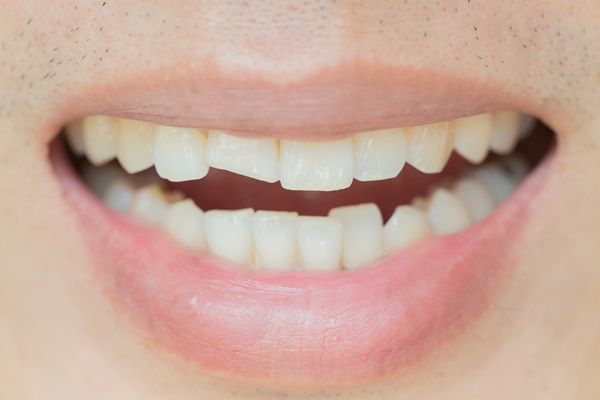3 Ways a Dentist May Fix a Chipped Tooth

A chipped tooth tends to occur at the worst possible times. It might be a result of getting hit in the face while playing a contact sport or biting into hard candy. Chipped teeth require treatment regardless of how minor they might seem. The damage usually removes portions of enamel, creating a weak point for acids to attack the tooth. As a result, a chipped tooth is more susceptible to tooth decay than a healthy one.
Treatments that a dentist might recommend for a chipped tooth
Dentists have several treatments at their disposal that can be used to restore chips. The severity of the damage to the patient’s tooth often determines which treatments are recommended by the dentist. Factors like how much the patient is willing to pay also play a role. Popular treatments for chipped tooth include the following.
1. Composite bonding
This process involves applying a composite resin made from mixtures of plastics and glass. The composite is color-matched with the rest of the patient’s teeth so any repairs made do not stick out. Applying a composite to a person’s tooth is a non-invasive treatment, so it can be replaced if a better solution is developed in the future.
The process starts with the dentist preparing the patient’s tooth for the procedure by removing any debris left in the tooth and cleaning the area. An etching solution that consists of about 35% of phosphoric acid is then used to roughen the outer surface of a tooth. It leads to a better bond with the composite.
The putty-like resin is applied to the tooth and shaped as desired. It is hardened with a curing light and polished to finish the process. The entire process takes about 45 minutes.
2. Veneers
A veneer is a tooth-shaped shell that is cemented to the front side of a tooth. It is used to hide flaws like a chipped tooth. The veneer looks like a real tooth, so it is virtually impossible to tell that the patient has had any work done on their teeth. The process of getting veneers typically requires two trips to the dentist. During the first visit, the patient’s tooth is prepared for the restoration by removing portions of enamel.
3. Crowns
Dental crowns are versatile restorations that can be used to address severely chipped teeth. These restorations completely cover the visible part of a tooth and hide its flaws. A crown also protects the tooth from irritants in the mouth, like acids and bacteria. It is a long-lasting solution for a chipped tooth.
Get your chipped teeth fixed
Tired of your chipped tooth ruining the way that your smile looks? Give us a call or visit our Scarsdale clinic to set up an appointment with our dentist.
Request an appointment here: https://www.thescarsdaledentist.com or call The Scarsdale Dentist at (914) 491-5802 for an appointment in our Scarsdale office.
Check out what others are saying about our dental services on Yelp: What Should I Do If I Chip My Tooth in Scarsdale, NY.
Related Posts
Replacing your missing tooth protects your dental health while restoring the appearance of your smile. Replacing a lost tooth with an oral prosthetic often starts with a consultation with a dentist. The dentist evaluates the patient’s teeth and gums before recommending missing teeth replacement options that are best suited for them.Consulting with a dentist about…
Implant restorations are a highly effective solution for replacing missing teeth, offering patients a durable, natural-looking option that restores functionality and aesthetics. They involve a process that combines the surgical placement of a dental implant with the creation and attachment of a prosthetic crown or other dental appliance. Take a look at this step-by-step guide…
Maintaining good oral health is essential to a healthy lifestyle. Regular visits to a general dentist are crucial in preventing and treating different dental issues. General dentists provide a wide range of services, such as preventive care, restorative treatments, and oral health education. However, if you are new to an area or are changing dentists,…
Regular visits to a general dentist are vital in maintaining healthy teeth and gums. General dentists are often primary care providers for dental health. They are specially trained to provide a wide range of services daily to prevent, diagnose, and treat oral health issues. This ensures their patients have healthy, functional, and beautiful smiles. The…
